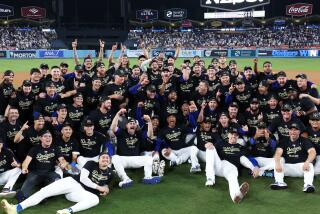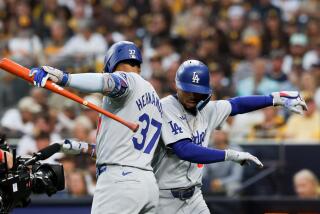REMEMBER WHEN : Kroc’s Tirade Shook Up ’74 Padres : Baseball: The new owner didn’t like what he saw during the home opener against the Astros, and he let everyone know it.
SAN DIEGO — “I have never seen such stupid ballplaying in my life.”
RAY KROC April 9, 1974
It wasn’t an auspicious home debut for Ray Kroc as owner of the Padres, but he couldn’t contain himself.
To say that Kroc was upset with his new employees would be to understate the case. He was so enraged that he grabbed the public-address microphone and told the Padres what he thought about the way they were playing.
Kroc unleashed his tirade during the Padres’ home opener against the Houston Astros at San Diego Stadium on April 9, 1974, just two months after buying the club and sparing San Diego the loss of its National League team to Washington, D.C.
Understandably, Kroc’s words brought negative feedback that was overwhelming, from the players all the way up to Commissioner Bowie Kuhn.
Many of the Padre players were so angry that they considered boycotting the next game, according to Steve Arlin, the losing pitcher that night and now a San Diego dentist.
“We were all embarrassed by it,” Arlin said recently. “We weren’t playing well, but we didn’t need to be reminded. We didn’t boycott because Kroc apologized, and I suppose that let him off the hook.”
And some levity came out of the mess, thanks to the promotional talent of the Padres’ president, Buzzie Bavasi.
Bavasi got an idea from postgame comments made by Astro third baseman Doug Rader, who later played and coached for the Padres and now manages the Angels.
Referring to the fact that Kroc had made his millions by marketing hamburgers as board chairman of the McDonald’s Corp., Rader said, “He thinks he’s in a sales convention dealing with a bunch of short-order cooks. That’s not the way to go about getting a winner. Somebody ought to sit him down and straighten him out.”
Bavasi picked up on this by designating the first night of the Astros’ next visit as Short-Order Cooks’ Night. Any fan wearing a chef’s hat would be admitted free.
Rader, the Astros’ captain, took the lineup card to home plate wearing a chef’s hat and an apron and carrying a skillet and spatula. He presented the lineup card to the home plate umpire by slipping it off the skillet like a pancake.
Only about 300 fans took advantage of the free offer, and attendance was a disappointing 10,776, but it wasn’t long before the Padres finally caught on. Despite making it six for six in last-place finishes, they drew 1,075,399 in 1974 after never drawing more than 644,272.
“We had brought in several name players,” said Bavasi, now retired and living in La Jolla. “Players like Willie McCovey and Glenn Beckert and Bobby Tolan gave the team credibility that we never had before.”
There also are those who feel that Kroc’s seemingly ill-advised remarks had something to do with the sudden increase in Padre attendance. Former Padre announcer Dave Campbell, who played for the Astros then, subscribes to that theory.
Said Campbell, now with ESPN: “The long-term interpretation of what Kroc said was that the people of San Diego realized they finally had an owner who cared.”
Actually, considering what was to follow, Kroc seemed reasonably tolerant of the Padres’ ineptitude between a three-game wipeout at Dodger Stadium that opened the season and the home opener.
After the third loss to the Dodgers, Kroc said, “They’re snake-bit, and they’ve got the yips. They’re overanxious, trying too hard, too tense. We’ll get it straightened out. There are 159 games to play.
“Fans are basically pessimistic. A lot of people are still talking about the next Depression. But you watch. We’ll fool them.”
Then, the night before the home opener, Kroc spoke in equally positive terms at the preseason baseball dinner at the Town & Country Hotel.
After making it clear that there would be changes if the Padres didn’t improve, Kroc said, “It was a lost weekend (in Los Angeles). The season opens tomorrow night. These are professionals, and they’re going to win for us.”
But not opening night. Kroc’s first home game as owner was played before a crowd of 39,083, the Padres’ second largest since their founding in 1969. Maybe that helped push his patience to the breaking point.
Among other things, Matty Alou lost track of the outs and was doubled off first base on a foul to the catcher with the bases loaded.
The game was in the middle of the eighth, and the Padres were well on their way to running their record to 0-4. Houston was ahead, 9-2, thus continuing a trend set by the Padres in beatings of 8-0, 8-0 and 9-2 in Los Angeles.
As soon as the Astros had been retired in the top of the eighth, Kroc went into the public-address booth and told announcer John De Mott that he had something to say.
Something indeed.
Kroc began innocently enough, saying, “Ladies and gentlemen, I suffer with you.”
At that point, a streaker leaped over the railing of the stands in left and raced across the field.
A roar went up from the crowd. When Kroc spotted the uninvited guest, he yelled, “Get him out of here. Throw him in jail.”
In a matter of seconds, the streaker had disappeared into the tunnel, police and security guards in hot pursuit.
After the fans settled down, Kroc continued: “There is good news and bad news. First, the good news. You loyal fans outdid Los Angeles. They had 31,000 for opening night and we have nearly 40,000. God bless you. Now for the bad news. I have never seen such stupid ballplaying in my life.”
That was it . . . short and not at all sweet.
The Padres promptly roused themselves sufficiently to score three runs, losing by only 9-5, the closest of the season to that point. They then lost two more games, both 9-1, before finally winning en route to a 60-102 record.
But the big story was the reaction to Kroc’s remarks, and to his credit, he lost no time in expressing his regrets.
The next day, he said, “I phoned home, and my wife gave me hell. I never should have gone on. We were playing bad ball. We weren’t giving the fans the kind of show we wanted to give them.
“I think my statement was misconstrued. What I meant was, well, sometimes you have a partner in golf who goofs one. You give him the needle. It was an impulsive thing.”
Kroc then made his apology to the players through McCovey, the Padre player representative, but the damage had been done. His oratory had sent shock waves to everybody in baseball.
There were words of censure from Kuhn, a complaint from Marvin Miller, head of the players’ union, and a directive from Chub Feeney, president of the National League, that only the public-address announcer was authorized to speak into a stadium microphone.
(This was the same Chub Feeney whose post-retirement career as president of the Padres ended shortly after he made an obscene gesture to hecklers on Fan Appreciation Night in 1988.)
When Miller heard about Kroc’s blast, he said, “The managers of the San Diego and Houston clubs have demonstrated by their restraint in the face of Mr. Kroc’s inexcusable insults that their intelligence far exceeds his.”
McCovey, acting as spokesman for the Padre players, said, “I’ve played baseball for 19 years, and I’ve never been called stupid before in the middle of a game over the PA system by the owner.
“I have nothing but respect for the man, but we’re professionals, and we deserve better than that. I don’t think this has ever been done in the history of baseball. Until somebody comes down from the front office and talks with the team, this thing is going to be a cloud hanging over every player out there.”
Some Astros said they were just as upset as the Padres.
--Manager Preston Gomez, who was the Padres’ first manager and now is assistant to Mike Port, general manager of the Angels: “I’ve managed in Latin America under owners that were nuts, but I’ve never seen anything like this happen before. You should never try to embarrass people publicly.”
--Denis Menke, the Astros’ player representative, now a coach for the Philadelphia Phillies: “He ruined a big night in this city, for our team as well as his. He made this a bad week for baseball. He isn’t dealing with hamburger people; he’s dealing with professional athletes.”
--Pitcher Claude Osteen, now a minor league pitching coach for the Dodgers: “I couldn’t believe it. It’s a shame, because he’s the one who rescued baseball for San Diego.”
--Infielder Tommy Helms, now a minor league manager for the Chicago Cubs: “You can’t kick a horse when he’s down. What’s he going to say if they go out and win 10 straight?”
Other Padre players let McCovey do their talking for them, both before and after Kroc’s apology, which was made to McCovey by telephone. Afterward, McCovey said, “The players are satisfied, and the matter is closed. We want to get down to the business of winning ballgames for Mr. Kroc and the fans of San Diego.”
Today, 16 years later, most of those who were touched in some way by Kroc’s address look back on it light-heartedly.
Bavasi recalled that he was faced with another problem at the time.
“Ray and I were sitting together when I got a phone call,” Bavasi said. “There was a leak in the clubhouse from a concession stand, and soon there was a real flood.
“As I got on the elevator, I heard Ray say something about the big crowd, and I thought, ‘That’s nice of Ray, thanking the fans for turning out.’ I didn’t hear any more, so when I got back, I was stunned. I talked to him immediately, and he regretted saying it, but there was nothing he could do.
“After the game, they had me on the (radio) wrap-up show. All I said was, ‘Ray is an impulsive man who says what he thinks, and if he embarrassed anybody, he’s sorry.’
“Actually, I think we made some fans that night. Ray said what the fans would like to have said. And as far as the players were concerned, the real pros knew what he was trying to do.”
Randy Jones, the 1976 Cy Young Award winner who lives in Poway, said he enjoyed Kroc’s comments.
“I really laughed,” Jones said. “I thought it was pretty funny. I thought he was right on. It was consistent with the way we were going.
“Ray was a great guy and a great man. If it hadn’t been for him, we would have been in Washington. Everything at the ballpark was packed up until he bought the club.”
Pitcher Gary Ross, now owner of a liquor store in Encinitas, was somewhat less enthusiastic.
“It was funny, but we were kind of shocked,” Ross said. “At first, everybody got ticked off. I was in the bullpen, and when we heard it, we ducked into the cubbyhole out there and stayed out of sight.”
Jerry Coleman, then as now the Padres’ lead broadcaster, recalled how Kroc’s speech was handled on radio:
“When it was announced that Ray had something to say, I told Tommy Jorgensen, who is still our producer and engineer, to pick it up on our field mike. When Ray got through, my only quote was, ‘Ladies and gentlemen, that was Padre owner Ray Kroc.’ I didn’t comment on it. I didn’t know what to say.”
Bavasi resigned the Padre presidency after the 1977 season ended to become executive vice president of the Angels. When he left San Diego, though, he carried with him warm memories of his a ssociation with Kroc, who died in January, 1984.
“Ray was one of the best owners I ever met,” Bavasi said. “The fact that I spent nine seasons with him made my 46 years in baseball worthwhile.”
Rader said he had acquired great respect for Kroc during his two tours of duty with the Padres.
“What he did that night was not necessarily done the right way,” Rader said. “Nevertheless, he was trying to help his team, that’s all. I never really got to know him, but when my name was brought up as a prospective coach, he said, ‘That guy’s got guts.’ That meant a lot to me, and San Diego will always have a special place in my heart.
“When Buzzie called me and told me they were putting on that cooks’ night, I thought it was a terrific promotion. The whole situation turned out to be a fun thing.”
BACKGROUND
Ray A. Kroc, founder of McDonald’s Corp., saved baseball for San Diego in 1974 when he purchased the Padres shortly before a scheduled move to Washington, D.C. The Padres won their only National League championship after his death on Jan. 14, 1984. Kroc family ownership of the club continued under Ray’s wife, Joan, until last week, when it was sold to a group headed by television producer Tom Werner.
More to Read
Go beyond the scoreboard
Get the latest on L.A.'s teams in the daily Sports Report newsletter.
You may occasionally receive promotional content from the Los Angeles Times.









